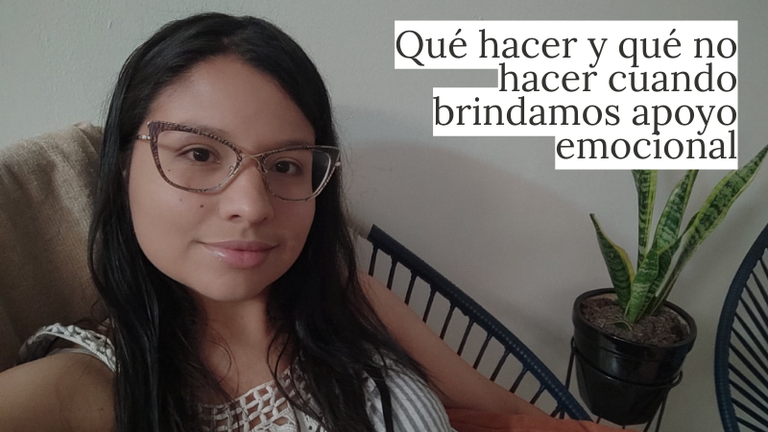¿Cómo acompañar a un ser querido en su dolor emocional?

Si la mayoría de las veces no sabemos bien cómo reaccionar ante nuestros propios estados de dolor y malestar, ¿cómo saber cómo ayudar a otros?
Realmente, no siempre es una tarea sencilla, sobre todo, cuando también estamos involucrados emocionalmente en el dolor de otras personas y sus emociones nos afectan en algún sentido.
El primer paso es entender que la vulnerabilidad no tiene por qué ser un problema. Por suerte, este es un punto que cada vez tiene más visibilidad en el presente y fomenta la expresión sana de las emociones. Es decir, cuando me siento mal, no tengo por qué reprimirlo, negarlo u ocultarlo. Es válido y posible sentirme mal hoy y trabajar internamente para sentirme mejor el día de mañana.
Si quieres apoyar a un ser querido que se encuentra atrevesando una situación difícil, es importante saber cuáles comentarios y actitudes ayudan poco en una situación como esa. Frases como:
- No deberías sentirte así por eso
- Si lloras entonces... (inserte cualquier consecuencia real o imaginada)
- No es tan grave como crees
- Mira como estoy yo que estoy pasando por esto y no me quejo
Estas frases, aunque tengan la intención de ayudar y alentar a que la otra persona se sienta mejor, el efecto puede ser contrario a lo deseado, pues prácticamente invalidan el sentir del otro y se está transmitiendo al mismo tiempo un doble mensaje: Quiero apoyarte pero verte sufrir me hace daño.
Otras actitudes que realmente no ayudan serían: dar consejos sin que la otra persona lo pida, hablar largamente sobre uno mismo y las propias experiencias suponiendo que eso va a ser de ayuda, no prestarle verdadera atención a lo que dice o restarle importancia, juzgar, hacer bromas pesadas, criticar o resaltar los errores del pasado que hacen ver que la persona se buscó la situación por la cual está atrevesando.
La próxima vez que quieras a ayudar a alguien que atraviesa una situación difícil recuerda que escucharla atentamente es una de las mejores cosas que puedes hacer. Esa persona no necesariamente necesita escuchar lo que tú tienes para decir, lo que más necesita es tu compañía, hablar y "sacar" el dolor que lleva por dentro. A veces ni siquiera pueden procesar lo que sienten, pero les hace bien tu compañía. Allí, estar en silencio, a su lado, es de grandísima ayuda.
Puede que te pida un consejo, o que tú sientas que puede serle útil alguna recomendación. Si es lo segundo, pregúntale antes de decir cualquier cosa si quiere saber lo que piensas. Cuando le hables, salte un poco de tu mundo e imagina por un momento que estás en sus zapatos. Inicia reflejando un poco su emoción, manifestando que comprendes por qué se siente de ese modo, que puedes sostener su emoción, su rabia, sin que eso altere la percepción que tienes de él o ella. Cuando aconsejes, conecta a la otra persona con su propia realidad. Cuando todo se derrumba proteger implica reestablecer lo básico. No funciona solo decirle qué hacer, funciona ayudarle a que retome su rutina, proveerle autocuidado, por ejemplo comida, cuando esa persona no pueda ni pensar en comer. Eso será de gran ayuda.
La vulnerabilidad es parte del ser humano y, aunque sé que puede dar miedo sentirse de ese modo, o que un ser querido se muestre así de vulnerable, también tiene un sentido a nivel emocional pasar por estos estados. Llorar alivia. Vivir cada emoción ayuda a procesar lo que ha sucedido.
Las pérdidas, decisiones complejas, rupturas, enfermedades, dificultades económicas son situaciones por las que todos podemos atravesar y vivimos de cerca a través de familiares y amigos. Estas son solo algunas sugerencias que nos pueden ayudar a acompañar a otros en su dolor emocional. Según tu experiencia, ¿qué funciona, qué alivia a la hora de acompañar emocionalmente a un ser querido? Nos vemos en los comentarios!


If most of the time we do not know how to react to our own states of pain and discomfort, how do we know how to help others?
Actually, it is not always a simple task, especially when we are also emotionally involved in other people's pain and their emotions affect us in some way.
The first step is to understand that vulnerability does not have to be a problem. Fortunately, this is a point that has more and more visibility in the present and encourages the healthy expression of emotions. That is, when I feel bad, I don't have to repress it, deny it or hide it. It is valid and possible to feel bad today and work internally to feel better tomorrow.
If you want to support a loved one who is going through a difficult situation, it is important to know what comments and attitudes are of little help in such a situation. Phrases like:
- You shouldn't feel that way about it
- If you cry then... (insert any real or imagined consequences)
- It's not as bad as you think
- Look how I'm going through this and I'm not complaining
These phrases, although they are intended to help and encourage the other person to feel better, the effect may be contrary to what is desired, since they practically invalidate the other person's feelings and at the same time a double message is being transmitted: I want to support you but seeing you suffer hurts me.
Other attitudes that really do not help would be: giving advice without the other person asking for it, talking at length about oneself and one's own experiences assuming that this will be helpful, not paying real attention to what the other person says or downplaying its importance, judging, making bad jokes, criticizing or highlighting past mistakes that make it seem that the person asked for the situation he/she is going through.
The next time you want to help someone who is going through a difficult situation, remember that listening carefully is one of the best things you can do. That person doesn't necessarily need to hear what you have to say, what they need most is your company, to talk and "get out" the pain they are carrying inside. Sometimes they can't even process what they are feeling, but it does them good to have your company. There, being in silence, by their side, is a great help.
He may ask you for advice, or you may feel that you can be useful to him. If it is the latter, ask him before saying anything if he wants to know what you think. When you talk to him, step out of your world and imagine for a moment that you are in his shoes. Start by mirroring a little of his or her emotion, showing that you understand why he or she feels the way he or she does, that you can hold his or her emotion, his or her anger, without altering your perception of him or her. When you counsel, connect the other person to his or her own reality. When everything falls apart protecting involves reestablishing the basics. It doesn't work to just tell him or her what to do, it works to help him or her get back into a routine, to provide self-care, for example food, when that person can't even think about eating. That will be of great help.
Vulnerability is part of being human, and while I know it can be scary to feel that way, or for a loved one to be that vulnerable, it also makes sense on an emotional level to go through these states. Crying soothes. Experiencing each emotion helps to process what has happened.
Losses, complex decisions, breakups, illnesses, financial difficulties are situations that we can all go through and live closely through family and friends. These are just a few suggestions that can help us accompany others in their emotional pain. In your experience, what works, what relieves when accompanying a loved one? See you in the comments!

Todas las imágenes de esta publicación son de mi autoría, editadas en snapseed y canva. El contenido también es original y propio.
All images in this post are my own, edited in snapseed y canva. The content is also original and mine.

Congratulations @sofiaquino98! You have completed the following achievement on the Hive blockchain And have been rewarded with New badge(s)
Your next target is to reach 6000 replies.
You can view your badges on your board and compare yourself to others in the Ranking
If you no longer want to receive notifications, reply to this comment with the word
STOPCheck out our last posts:
Totalmente de acuerdo. Gracias por compartirnos esta información. Me gustaría dar mi aporte personal a través de una publicación.
Gracias a ti por sacar algo provechoso de ella. 🌷